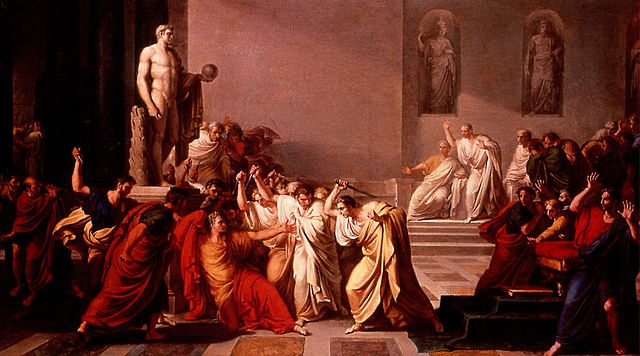
Public Domain
Today is 15 March and on the old Roman calendar was a day of religious observance to the Roman god Jupiter and other lesser deities. But it is most famous as the date in 44 BC when Julius Caesar was assassinated at a meeting of the Roman Senate. 60 conspirators were involved but the leaders were Brutus and Cassius. Caesar was forewarned of his death by a seer according to Plutarch. And in his famous work Julius Caesar, Shakespeare has the soothsayer say “beware the ides of March” which Caesar ignores and of course he ends up stabbed to death uttering the famous line before death:
Et tu Brute!
The assassination was a turning point for Rome. It brought about a civil war and ended the Roman Republic. Octavian (later Augustus) would become emperor and the Roman Empire would come to dominate the entire Mediterranean Sea, North Africa, and parts of Europe and Britain. In Julius Caesar Mark Antony gives perhaps the most remembered funeral oration ever done. Most people recall the famous opening line:
Friends, Romans, countrymen, lend me your ears! I come to bury Caesar, not to praise him. The evil that men do lives after them; the good is oft interred with their bones; so let it be with Caesar.
The oration is masterful in that it cleverly turns the people against Brutus and Cassius by showing they were ambitious and not Caesar. By the end the plebeians call them traitors and murderers.
In real life, it was much the same. Antony played them by seemingly supporting amnesty but turning people against them both. Brutus was forced to leave and ended up on Crete, Cassius went east to gather support among the governors and to amass an army. Antony and Octavian would clash militarily causing divisions in Rome. This allowed the forces of Brutus and Cassius to march on Rome. However Octavian made peace with Antony upon this news so both forces joined to stop Brutus and Cassius. They met at Philippi on 3 Oct 42 BC. The first battle resulted in Brutus defeating Octavian but Antony defeating Cassius. Not knowing that Brutus had defeated Octavian, Cassius took his own life. At the second battle of Philippi on 23 October, Brutus was defeated and forced to flee into the hills where he committed suicide. Antony treated his body with great respect by having it wrapped his most expensive purple mantle. His body was cremated and remains sent to his mother.
Sources:
- Ides of March (History.com)
- Julius Caesar (Britannica.com)









